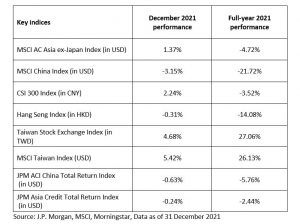Multi-Asset Perspective – January 2022
21-01-2022
In China, the country has started to gradually implement both fiscal and monetary stimulus to support the economy. Regulatory concerns have also started to ease.
Elsewhere in the region, the Fed’s more hawkish pans of speeding up the pace of interest rate hikes and the strong US dollar may not bode well of Asia ex-Japan. But sentiment has improved in some parts of the market as they have started to reopen.
China / Hong Kong Equities
- The US market started to correct amid the more hawkish tone from the Fed, persistent inflation and rising yields. Together with the surging Omicron cases in Hong Kong resulting in tightening social measures, sentiment will remain weak in the near term.
- On the other hand, China has begun a gradual easing to support the economy. Attractive valuations will support Hong Kong-listed Chinese stocks.
China A-Shares
- China’s economic growth is expected to slow down in the first half of the year. Analysts have also continued to downgrade companies’ earnings forecasts. China has started to gradually implement both fiscal and monetary stimulus to support the economy, although it will take six-nine months to see economic data to significantly pick up.
- On the other hand, credit supply has been improving and regulatory concerns have started to ease.
Asia Ex-Japan Equities
- The Fed has turned more hawkish with plans of speeding up the pace of interest rate hikes. The market expects the first rate hike to be in March, with a total of three-four rate hikes this year. Global yields have been shifting upwards rapidly as a result. The US dollar will remain strong in the near term. This macroeconomic backdrop does not bode well for Asia ex-Japan equities, especially those with high valuations.
- On the other hand, sentiment in Southeast Asia has improved as markets have started to reopen.
Emerging Market Ex-Asia Equities
- The Fed’s tapering and rising Treasury yields do not bode well for emerging market equities.
- However, as OPEC has strong intentions to control the oil supply to maintain the oil price at the current level, oil prices remain elevated. Together with surging agricultural commodity prices, selective emerging markets remain supported.
Japanese Equities
- Corporate earnings are set to continue to recover and Japan is expected to be one of the very few countries that will continue to have earnings upgrades. Also, it is the only country that should benefit from imported inflation.
- However, its recent surging Omicron cases will likely impact investor sentiment and the expectations of the pace of reopening. Also, with the hawkish Fed, the Japanese yen will remain under pressure.
Asia Investment Grade Bonds
- The rising Treasury yields given the expectations of an earlier and faster rate hike cycle has caused investment grade bonds to suffer from longer d The US 10-year Treasury yield will likely break above 2%.
- Also, credit spreads remain tight, and may widen as the economy slows down and inflation concerns remain.
Asia High Yield Bonds
- With the gradual easing kicking off in China and some regulatory relaxation in the property sector, investor sentiment has improved towards the higher quality Asia / China high yield bonds. China high yield’s credit spreads have stabilized and Asia high yield spreads have started to tighten. It is an early sign of returning confidence in the asset class.
Emerging Market Debt
- Central banks around the world are expected to be more hawkish amid rising inflation expectations.
- However, EM CDS have been falling and volatility in EM bonds have come down. The recovery in oil and selected commodity prices will continue to provide support to the asset class.
Gold
- The strong US dollar and rising Treasury yields do not bode well for Gold. However, the Omicron variant added uncertainty to the global economic recovery. Also, over the long term, Gold remains a good hedge against geopolitical uncertainties and would benefit from easing fiscal policies.
Multi-Asset
- Multi-asset offers lower volatility compared to traditional single-asset or balanced portfolios. However, the correlation between risk-assets, such as equities, credits, and commodities, has increased dramatically recently. In an uncertain environment with low yields, income becomes an essential source of return for investors.
The views expressed are the views of Value Partners Hong Kong Limited only and are subject to change based on market and other conditions. The information provided does not constitute investment advice and it should not be relied on as such. All materials have been obtained from sources believed to be reliable as of the date of presentation, but their accuracy is not guaranteed. This material contains certain statements that may be deemed forward-looking statements. Please note that any such statements are not guarantees of any future performance and actual results or developments may differ materially from those projected.
Investors should note that investment involves risk. The price of units may go down as well as up and past performance is not indicative of future results. Investors should read the explanatory memorandum for details and risk factors in particular those associated with investment in emerging markets. Investors should seek advice from a financial adviser before making any investment. In the event that you choose not to do so, you should consider whether the investment selected is suitable for you.
This commentary has not been reviewed by the Securities and Futures Commission of Hong Kong. Issuer: Value Partners Hong Kong Limited.






